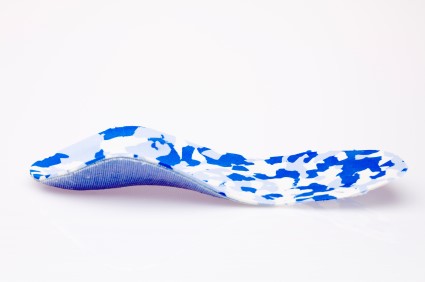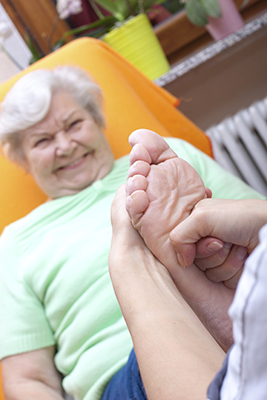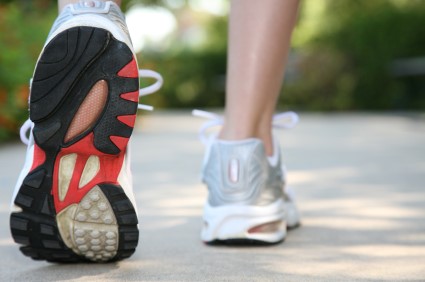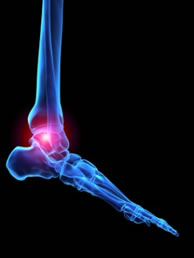Items filtered by date: November 2016
Arch Support and Your Feet
 It is no secret that high heels are bad for the feet. The human foot is not designed to wear extremely high heels, forcing the foot to adjust to the unnatural height difference when heels are worn. Additionally, women who have flat feet are more susceptible to foot problems due to a lack of arch support in high heels. Examples of such foot problems include arch pain, foot cramps, tired feet, and leg fatigue. Over-the-counter arch products are a solution to the lack of arch support in many types of footwear and may help prevent foot problems in the future.
It is no secret that high heels are bad for the feet. The human foot is not designed to wear extremely high heels, forcing the foot to adjust to the unnatural height difference when heels are worn. Additionally, women who have flat feet are more susceptible to foot problems due to a lack of arch support in high heels. Examples of such foot problems include arch pain, foot cramps, tired feet, and leg fatigue. Over-the-counter arch products are a solution to the lack of arch support in many types of footwear and may help prevent foot problems in the future.
If you are having discomfort in your feet and would like to try orthotics, contact Dr. Michael E. Newman of Pennsylvania. Our doctors can provide the care you need to keep you pain-free and on your feet.
What are Orthotics?
Orthotics are inserts you can place into your shoes to help with a variety of foot problems such as flat feet or foot pain. Orthotics provide relief and comfort for minor foot and heel pain, but can’t correct serious biomechanical problems in your feet.
Over-the-Counter Inserts
Orthotics come in a wide variety of over-the-counter inserts that are used to treat foot pain, heel pain, and minor problems. For example, arch supports can be inserted into your shoes to help correct over arched or flat feet, while gel insoles are often used because they provide comfort and relief from foot and heel pain by alleviating pressure.
Prescription Orthotics
If over-the-counter inserts don’t work for you, or if you have a more severe foot issue, it is possible to have your podiatrist prescribe custom orthotics. These high quality inserts are designed to treat problems such as abnormal motion, plantar fasciitis, and more severe heel pain. They can even be used to help patients suffering from diabetes by treating foot ulcers and painful calluses, and are usually molded to your feet individually, which allows them to provide full support and comfort.
If you are experiencing minor to severe foot or heel pain, it’s recommended to speak with your podiatrist on the possibilities of using orthotics. A podiatrist can determine which type of orthotic is right for you and allow you to take the first steps towards being pain free.
If you have any questions please feel free to contact one of our offices located in Plymouth Meeting and Ambler, PA. We offer the newest diagnostic and treatment technologies for all your foot and ankle needs.
9.3 Percent of Americans Have Diabetes
 According to a study published by Diabetes Technology & Therapeutics that focused on Type 2 diabetes cases, “patient-centered care may improve diabetes self-management and patients’ quality of life.” Researchers sought to understand the relationship between patient care and glycemic control. About “an estimated 29.1 million Americans -- 9.3 percent of the US population,” have diabetes, says the Centers for Disease Control (CDC). Patient-centered care focuses on aligning health care with personal values.
According to a study published by Diabetes Technology & Therapeutics that focused on Type 2 diabetes cases, “patient-centered care may improve diabetes self-management and patients’ quality of life.” Researchers sought to understand the relationship between patient care and glycemic control. About “an estimated 29.1 million Americans -- 9.3 percent of the US population,” have diabetes, says the Centers for Disease Control (CDC). Patient-centered care focuses on aligning health care with personal values.
Diabetic foot care is important in preventing foot ailments such as ulcers. If you are suffering from diabetes or have any other concerns about your feet, contact Dr. Michael E. Newman of Pennsylvania. Our doctors can provide the care you need to keep you pain-free and on your feet.
Diabetic Foot Care
Diabetes affects millions of people every year. Diabetes can damage blood vessels in many parts of the body, including the feet. Because of this, taking care of your feet is essential if you have diabetes, and having a podiatrist help monitor your foot health is highly recommended.
The Importance of Caring for Your Feet
- Routinely inspect your feet for bruises or sores.
- Wear socks that fit your feet comfortably.
- Wear comfortable shoes that provide adequate support.
Patients with diabetes should have their doctor monitor their blood levels because blood sugar levels play such a huge role in diabetic care. Monitoring these levels on a regular basis is highly advised.
It is always best to inform your healthcare professional of any concerns you may have regarding your feet, especially for diabetic patients. Early treatment and routine foot examinations are keys to maintaining proper health, especially because severe complications can arise if proper treatment is not applied.
If you have any questions please feel free to contact our offices located in Plymouth Meeting and Ambler, PA. We offer the newest diagnostic and treatment technologies for all your foot and ankle needs.
Wearing Proper Shoes May Reduce Injury Risk
 Shoes are important in determining the comfort of your feet, but they are also important in mitigating the risk of injury. According to those who run with minimalist shoes, it is suggested that shoes with low or no heel-to-toe drop can help lead to a reduced risk of injury. This shoe concept allows the feet to run and distribute impact force and weight more evenly. Shoes with higher heels can lead to your body being tilted out of alignment. Lower shoe drops can also help with relief for injuries or conditions such as Morton’s neuroma or arthritic joint pain.
Shoes are important in determining the comfort of your feet, but they are also important in mitigating the risk of injury. According to those who run with minimalist shoes, it is suggested that shoes with low or no heel-to-toe drop can help lead to a reduced risk of injury. This shoe concept allows the feet to run and distribute impact force and weight more evenly. Shoes with higher heels can lead to your body being tilted out of alignment. Lower shoe drops can also help with relief for injuries or conditions such as Morton’s neuroma or arthritic joint pain.
Exercising your feet regularly with the proper foot wear is a great way to prevent injuries. If you have any concerns about your feet, contact Dr. Michael E. Newman of Pennsylvania. Our doctor can provide the care you need to keep you pain-free and on your feet.
How to Prevent Running Injuries
Many common running injuries are caused by overuse and overtraining. When the back of the kneecap starts wearing out and starts causing pain in your knee, this is commonly referred to as runner’s knee. Runner’s knee is a decrease in strength in your quadriceps and can occur if you’re not wearing properly fitted or supporting shoes. To prevent runner’s knee, focusing on hip strengthening is a good idea, as well as strengthening your quads to keep the kneecaps aligned.
What Are Some Causes of Running Injuries?
- One cause of a common running injury is called iliotibial band syndrome.
- Plantar fasciitis is also another common injury.
- Stress fractures can occur from overtraining, lack of calcium, or even your running style.
Best Ways to Prevent Running Injuries
- Wear footwear that fits properly and suits your running needs.
- Running shoes are the only protective gear that runners have to safeguard them from injury.
- Make a training schedule. Adding strengthening exercises as well as regular stretching can help keep you strong and limber and can lessen the possibility of injuries.
- Stretching keeps muscles limber, this will help you gain better flexibility.
If you have any questions please feel free to contact our offices located in Plymouth Meeting and Ambler, PA. We offer the newest diagnostic and treatment technologies for all your foot and ankle needs.
Arthritis May lead to Rashes and Weight Gain
 Arthritis occurs as swelling and inflammation of the body’s joints, leading to symptoms such as rashes, itchiness, fever, weight loss, and trouble breathing, according to the National Institute of Arthritis and Musculoskeletal and Skin Disease. Arthritis results when the body’s immune system begins mistakenly attacking healthy cells, particularly in the joints. The different forms of arthritis include rheumatoid arthritis, osteoarthritis, psoriatic arthritis, fibromyalgia and gout.
Arthritis occurs as swelling and inflammation of the body’s joints, leading to symptoms such as rashes, itchiness, fever, weight loss, and trouble breathing, according to the National Institute of Arthritis and Musculoskeletal and Skin Disease. Arthritis results when the body’s immune system begins mistakenly attacking healthy cells, particularly in the joints. The different forms of arthritis include rheumatoid arthritis, osteoarthritis, psoriatic arthritis, fibromyalgia and gout.
Arthritis can be a difficult condition to live with. If you are seeking treatment, contact Dr. Michael E. Newman of Pennsylvania. Our doctors can provide the care you need to keep you pain-free and on your feet.
Arthritic Foot Care
Arthritis is a joint disorder that involves inflammation of different joints in your body, such as in your feet. Arthritis is often caused by a degenerative joint disease and causes mild to severe pain in all affected areas. On top of this, swelling and stiffness in the affected joints can also be a common symptom of arthritis.
In many cases, wearing ill-fitting shoes can worsen the effects and pain of arthritis. Wearing shoes that have a lower heel and extra room can help your feet feel more comfortable. In cases of rheumatoid arthritis, the arch in your foot may become problematic. Buying shoes with proper arch support that contour to your feet can help immensely.
Alleviating Arthritic Pain
- Exercises that stretch the foot can prevent further pain and injury and increase mobility
- Most of the pain can be alleviated with anti-inflammatory drugs, heat, and topical medications
- Massages can help to temporarily alleviate pain.
It is best to see your doctor for the treatment that is right for your needs and symptoms. Conditions vary, and a podiatrist can help you determine the right method of care for your feet.
If you have any questions please feel free to contact one of our offices located in Plymouth Meeting and Ambler, PA. We offer the newest diagnostic and treatment technologies for all your foot and ankle needs.
